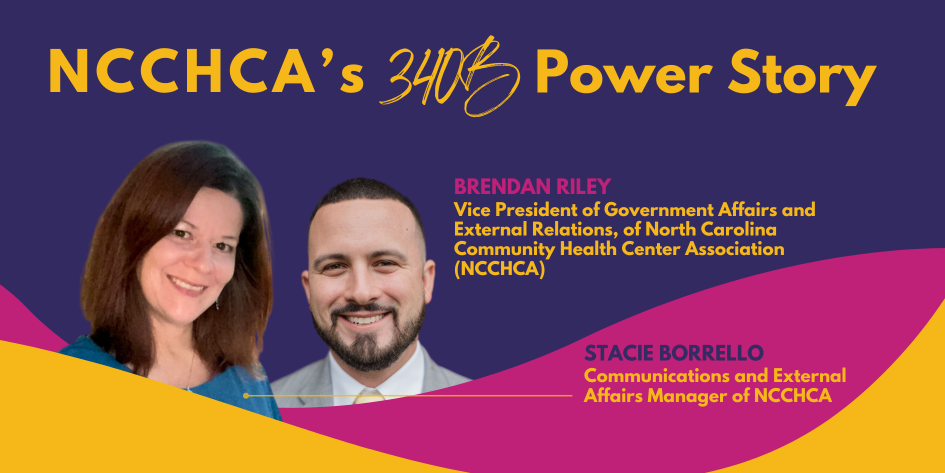On September 30, 2024 Johnson & Johnson (J&J) announced it was ending its plans to implement a 340B rebate model for two of its drugs, Stelara and Xarelto. The immediate halt to the rebate model was prompted by the Health Resources and Services Administration’s (HRSA) September 27 letter threatening to terminate J&J’s participation in the Medicaid and Medicare Part B markets.
After J&J’s initial August 23 letter stating its intention to begin a 340B Rebate Model, 340B stakeholders jumped into action effectively advocating for the end of this dangerous threat to their patients’ access to care.
The North Carolina Community Health Center Association (NCCHCA) mobilized its health centers early through an advocacy alert for its members. “In response to our advocacy alerts about the J&J rebate model, CHC advocates in North Carolina sent more than 550 letters to their members of Congress—showing how strong our collective voice can be,” said Stacie Borrello, Communications and External Affairs Manager for NCCHCA.
The shift to a rebate model threatened to fundamentally change how covered entities could operate within the 340B program.
Here Is Why:
Instead of receiving discounted medications upfront, safety net providers would need to pay full price and wait for reimbursement. This process would disrupt their cash flow and threaten their ability to provide care.
Community Health Centers, which are true safety net nonprofit organizations, operate on thin margins and could not afford the upfront costs of the pharmaceutical industry’s outrageously high list prices if this rebate model were applied to them.
“Under a rebate model, the fox is guarding the hen house, with drug makers themselves holding decision-making power about when and whether to eventually grant the statutorily required discount via rebate.”
– Brendan Riley, Vice President of Government Affairs and External Relations at NCCHCA
Health centers rely on 340B savings to sustain the comprehensive primary and preventive services they provide to patients without regard to the ability to pay. A 340B rebate model—the latest attack in a long list of moves to weaken the 340B program—would put Community Health Centers and patient access to care at risk.
“Educating and pushing our members of Congress on 340B now is essential to prevent these restrictions from eroding the very program that keeps the doors open for underserved communities.”
– Stacie Borrello, NCCHCA’s Communications and External Affairs Manager
While Health Centers were not named on the now defunct J&J notice, the precedent the industry wants to set is clear. If drugmakers were to successfully implement this rebate model with hospitals, Community Health Centers would likely be next.
“We’ve seen this same pattern of mushrooming restrictions before,” Riley shared. “Back in 2020, 340B contract pharmacy restrictions started with just one drug—Cialis—and one manufacturer—Eli Lilly. Now dozens of drug makers restrict 340B discounts on hundreds of drugs, and manufacturers that initially did not apply restrictions to health centers have now broadened their scope.”
Advocacy on 340B has momentum in North Carolina.
NCCHCA says Congress must codify 340B protections to prevent drug manufacturers from implementing rebate models and other barriers that could undermine the program.
“Without action, we’ll continue to see growing restrictions chip away at the savings Health Centers depend on to provide care to vulnerable communities. By enacting clear, bipartisan reform, Congress can ensure 340B continues to provide affordable medications and support comprehensive care.”
– Stacie Borrello, NCCHCA’s Communications and External Affairs Manager
In A Nutshell:
The rebate program was a strategic move by drugmakers to undermine the 340B program, creating unnecessary barriers that will make it harder for Community Health Centers to provide affordable care. If HRSA hadn’t acted, it could have severely limited access to medications and healthcare for the most vulnerable communities.
340B Stakeholders like NCCHCA have much to be proud of in their successful efforts to stop J&J’s 340B rebate model. Advocates mobilized quickly and effectively and HRSA was able to take strong and definitive action against this illegal scheme. Community Health Center advocates will continue to organize to defend the 340B program, no matter what roadblocks drug makers attempt to send our way.
Defend 340B and Take Action Now
See below for ways you can defend 340B today and increase patient health outcomes in your community:
Subscribe to #Defend340B Action Alerts
Get all the latest from CV340B and stay connected with the #Defend340B community!
"*" indicates required fields







